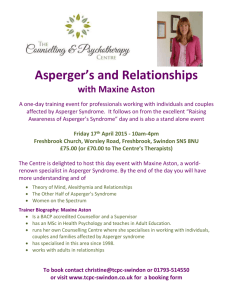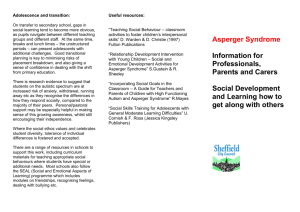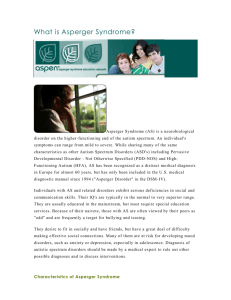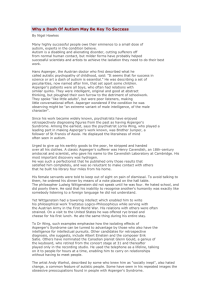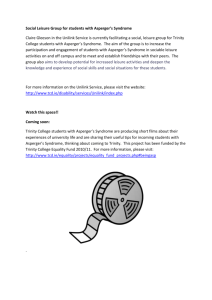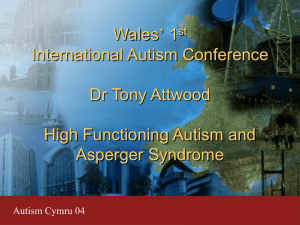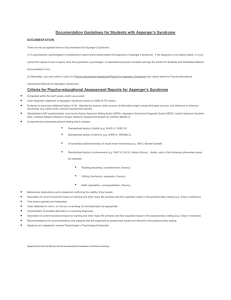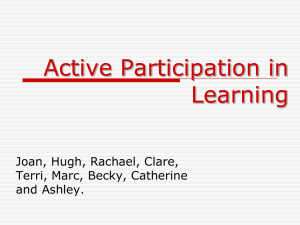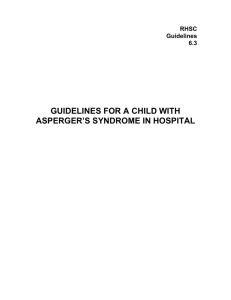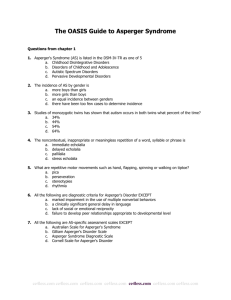Document 11168331
advertisement
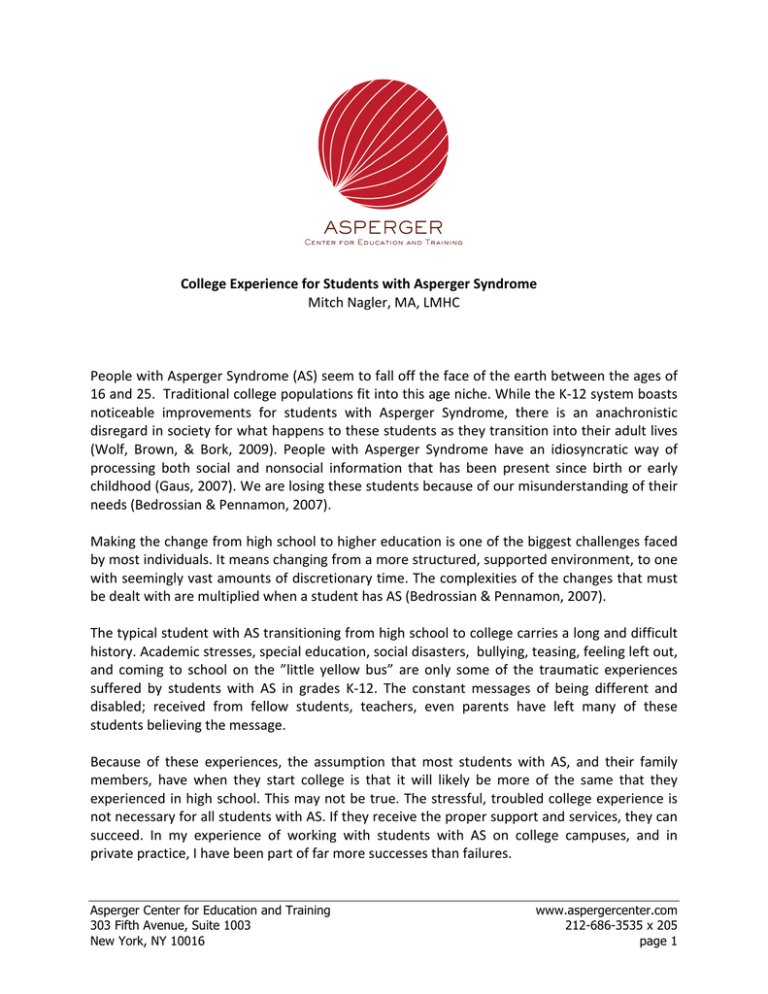
College Experience for Students with Asperger Syndrome Mitch Nagler, MA, LMHC People with Asperger Syndrome (AS) seem to fall off the face of the earth between the ages of 16 and 25. Traditional college populations fit into this age niche. While the K-­‐12 system boasts noticeable improvements for students with Asperger Syndrome, there is an anachronistic disregard in society for what happens to these students as they transition into their adult lives (Wolf, Brown, & Bork, 2009). People with Asperger Syndrome have an idiosyncratic way of processing both social and nonsocial information that has been present since birth or early childhood (Gaus, 2007). We are losing these students because of our misunderstanding of their needs (Bedrossian & Pennamon, 2007). Making the change from high school to higher education is one of the biggest challenges faced by most individuals. It means changing from a more structured, supported environment, to one with seemingly vast amounts of discretionary time. The complexities of the changes that must be dealt with are multiplied when a student has AS (Bedrossian & Pennamon, 2007). The typical student with AS transitioning from high school to college carries a long and difficult history. Academic stresses, special education, social disasters, bullying, teasing, feeling left out, and coming to school on the ”little yellow bus” are only some of the traumatic experiences suffered by students with AS in grades K-­‐12. The constant messages of being different and disabled; received from fellow students, teachers, even parents have left many of these students believing the message. Because of these experiences, the assumption that most students with AS, and their family members, have when they start college is that it will likely be more of the same that they experienced in high school. This may not be true. The stressful, troubled college experience is not necessary for all students with AS. If they receive the proper support and services, they can succeed. In my experience of working with students with AS on college campuses, and in private practice, I have been part of far more successes than failures. Asperger Center for Education and Training 303 Fifth Avenue, Suite 1003 New York, NY 10016 www.aspergercenter.com 212-686-3535 x 205 page 1 Of course, leaving behind the educational structure and supports that many students with Asperger Syndrome have had in place from K-­‐12 is a major issue. There may be problems with executive functioning skills, which often lead to difficulties organizing and planning time effectively; learning style differences, which can lead to academic problems; poor social skills, which can lead to confusion and isolation; and sensory sensitivities, which can affect many daily living issues. The anxiety that often results from any, or all, of these issues can also become a major complication. Replacing the educational structure and support services provided previously begins in The Office of Disability Support Services (DSS). Every college or university has one. This is where services and accommodations will be provided. However, the major difference is that in college, services and accommodations are no longer mandated, and parents can no longer be involved. That means that the student must self identify, and self advocate. The documentation that supports needed accommodations; the most common of which are note takers, extra test taking time and a quiet room in which to take exams, must be provided to DSS. These documents can, and should, be provided by the family prior to the beginning to the freshman year. However, once classes begin, the student must go to the DSS office to access these accommodations. It is also recommended that the student disclose his/her disabilities to professors in order to make them aware of the situation. However, not surprisingly, students with AS often have difficulties or reluctance (avoidance) to accessing their own services. Since difficulties with social interactions is a key component of AS, asking these students to speak for themselves can be a problem. As well, there are some students who feel that “they are not like that anymore”, a rejection of past negative feelings of being different than other students. Some AS students shy away from any office that has the word “Disability” on it. And one student actually told me that he “used to have Asperger’s, but doesn’t have it anymore”. Clearly, these are issues that must be dealt with. While parents cannot be on campus, nor have significant contact with staff or faculty as they did during primary education, they can encourage and support their children to access services. Prior to selecting a college, parents and students are advised to visit the DSS office of any school that is under consideration in order to meet with the staff to assess what the level of experience and commitment are in supporting a student on the spectrum. Once the selection process has been completed, a second visit is encouraged to submit the documentation, promote mutual understanding, and begin the development of personal relationships. This can help to reduce student (and parent) anxiety, and may ease some of the student’s resistance to accessing services. Executive functioning skill problems present most clearly in time management and organizational problems. But, sleep management, medication management, money management, personal hygiene issues, and appropriate wardrobe choices can be included under this heading as well. And as is always the case with individuals with AS, increased anxiety Asperger Center for Education and Training 303 Fifth Avenue, Suite 1003 New York, NY 10016 www.aspergercenter.com 212-686-3535 x 205 page 2 will always negatively impact performance. Maintaining track of multiple assignments such as homework, papers and exams without support is often a problem for students with AS. The most common response to multiple assignments that I see, from my students is avoidance. This is because they are not able to, what I call, “see the trees for the forest”. Multiple assignments become one overwhelming, inseparable pile of work for them. Their inability to be able to cognitively separate the assignments causes them to feel great anxiety. They know the work must be done, but don’t know where or how to begin. I have had students tell me that situations like this have caused them to feel as if their “brains are on fire”. And so, when anxious, they avoid, and the work does not get done. In the worst cases, unmonitored avoidance of class work can also lead to avoidance to going to classes. It may seem obvious to suggest that this situation can be helped by having the student maintain a notebook or planner or calendar, where individual assignments and exams are written down on the date that they are due. Then regular reviews of the records should prompt for assignment completion. However, my experience is that this plan is often not maintained or reviewed regularly, and therefore becomes unreliable. When questioned as to why they haven’t maintained or checked their schedules, the most common response that I get from students with AS is simply a shrug of their shoulders. The other executive functioning issues that I see as most problematic are sleep and medication management. Going to sleep at 3 or 4 AM is not a great idea if you have a class or an exam at 9 AM. Playing “World of Warcraft” or “Street Fighter” or any of the other on-­‐line games that are available instead of sleeping has had disastrous results for many students with AS. Although, I did have one student who waited until the night before she had to have read Moby Dick, to sit down and begin to read it (which she did from cover to cover between 6 PM and 9 AM the next morning). As well, not taking medications regularly or reliably can often be a severe complication. I see part of this situation as anxiety based avoidance, but I can also see this as a presentation of denial. It’s another way of asserting that “I’m not like that anymore”. Either way, since anxiety and difficulty maintaining focus are often comorbid issues with AS students, the results of non-­‐ compliance with medication schedules usually ends badly. Assignments and studies are often put off when anxiety and the inability to focus are active. And since sleep is often medication managed, or at the very least affected, non-­‐compliance can impact on sleep and wakefulness as well. Social situations, where interpersonal communication and understanding are important is usually an area where most college students with AS struggle. Because they miss social cues, tend to avoid groups, and can act inappropriately, they often report feelings of loneliness and isolation, and often miss out on the experiences of campus life. It is not unusual for an AS student to spend an entire day (or days) on campus without speaking to anyone. Or, conversely, it is entirely possible for an AS student to try unsuccessfully to enter into many conversations or activities. Asperger Center for Education and Training 303 Fifth Avenue, Suite 1003 New York, NY 10016 www.aspergercenter.com 212-686-3535 x 205 page 3 As well, struggles with roommates and dorm life are common. It is not unusual for a student with AS to have to switch roommates multiple times. It might seem that this problem can be solved by having the student live in a single room. However, this solution is generally not advised since loneliness and isolation are common problems for individuals on the spectrum. Living alone gives too much opportunity to hide in the dorm room, and not interact with the world. Difficulties in communication can also lead to other problems. Unless college professors have been informed and sensitized to the communication and learning style differences of many students with AS, several problems can occur. Students who are visual learners can misinterpret, or miss entirely the meaning of lecture information and assignments. Due dates can be missed or misinterpreted. Some of this confusion can be avoided by regular checking of class syllabi, and the use of note takers. Class standing can also be misinterpreted. I have been asked to attend several student – professor meetings where the student thought that they were in imminent danger of failing the course, only to have the professor inform the student that they were getting either and A or a B. In fact, the professor had been impressed by the student’s work and talents. Of course, I have also been to meetings where the professor has been as frustrated and confused as the student has. Sensory sensitivities are also a common issue. The large crowds and bright lights of the student cafeteria can be a deterrent to going in for meals. I had a student who came to my office one day not looking very well at all. When I asked him whether he had been eating and sleeping well lately, he reported to me that for the past two weeks he had been eating granola bars and drinking water dispensed from the vending machines in his dorm because the he could not tolerate the cafeteria. He even me showed where the label of the granola bar stated that is was healthy. I also had a student who could not tolerate anyone touching his food. Another student that I worked with could not study in the library because the fluorescent lights made her dizzy. And another who struggled with having to sit too close to others in the lecture hall. So, what can be done to help these students? They have been accepted to their universities and colleges based on their high school grades and their SAT’s, so they must be smart enough to do the work. How can we help them to succeed? What I usually start my counseling or coaching relationships with is a reassurance to the student that they are indeed smart enough to succeed. But they will need help with the issues discussed above. Our primary targets will be trying to keep them focused and on schedule, challenging any dysfunctional thoughts and beliefs, and, of course, attempting to minimize their anxieties. Asperger Center for Education and Training 303 Fifth Avenue, Suite 1003 New York, NY 10016 www.aspergercenter.com 212-686-3535 x 205 page 4 In order to try to help them stay focused and on task, most students that I work with leave my office with a printed schedule of assignments due until our next meeting. This schedule is a joint effort that we create based on a review of each class’s syllabus. After listing the assignments and up coming exams, we work together to prioritize the work in order to decide what should be done first. Then the student will decide exactly when the work will be done, and we will note it next to the assignment. This document is then printed, and we each keep a copy. This process accomplishes several things. First, we have identified exactly what must be done, and when it is due. And by doing so, we have separated that big overwhelming pile into separate tasks. We have also given the student the option of deciding when each task will be done. Often built into the schedule is time for tutors, or going to the Writing Lab, or even exercise. The result is usually less anxiety about what to do, when to do it, or how to get started. The next time that the student returns to my office, we review the list to assess what was done, what wasn’t done, and why. This process will often reveal previously unknown problems or anxieties that we can try to address. Maybe it is a communication problem with a professor, or maybe teaching and learning styles are not matching up. Maybe the student is resistant to going for extra help or tutoring because of the anxiety associated with self advocating. Whatever problems that we can identify, we can try to work on. Similarly with social issues, dysfunctional beliefs will often cause self-­‐defeating behaviors. With social issues, I try to allow the students a safe environment to speak of their fears and confusion. I try to listen to them in a way that I can hear what the issues really are. Could it be the fear/anxiety of re-­‐experiencing past traumatic events that is inhibiting them? Could it be the expectation of failure that is leading them to avoid social situations? Could they be misreading social cues? In most cases, I encourage them to step slowly out of their rooms and back into the world, pointing out that there is no chance for success if they remain isolated. I also encourage students that I work with to join campus clubs, because clubs can often be opportunities to meet others who share similar interests, and develop relationships. Colleges and universities typically have dozens of student interest clubs. The Anime Club, the Chess Club, and the Horror Film Club have all provided safe opportunities for my students to socialize. This leads to the issue of how spectrum students perceive their problems, and how I try to encourage them to deal with them. My observation is that due to their long histories of academic and social problems, and failures, combined with that constant message received of being disabled and different, many of the students that I work with suffer from the symptoms associated with Post Traumatic Stress Disorder (PTSD). And I don’t blame them. Individuals with histories of feeling frequently traumatized typically view all problems as likely to end as disasters. Therefore, as soon as they sense trouble either in class, with studies, or in social situations, they will go immediately to their past historical feelings of failure. These feelings are often based on false beliefs. These can include the beliefs that they cannot be Asperger Center for Education and Training 303 Fifth Avenue, Suite 1003 New York, NY 10016 www.aspergercenter.com 212-686-3535 x 205 page 5 successful, or that they are doomed to failure anyway, so why even try. As soon as they begin to smell smoke, they assume that everything will burn down. In order to address dysfunctional or false belief systems, I will often speak of two concepts. First, I try to bring students to a position of being able to experience life in the moment, to understand that things that happened to them in the past are just that, in the past. “That was then, this is now” is one my favorite expressions. As well, we cannot control the future, so let’s not worry too much about that either. Let’s just try to stay in the moment without thinking too much about past events, or the possibility of future disasters. Success with this approach often dramatically reduces anxiety. Second, I offer the concept of problem solving as a way of addressing problems and fears. I challenge the belief that all problems must end as disasters. I actively seek to identify, with the student, as many possible solutions that we can think of to whatever the problem(s) may be. We list them, we review them, we question them; and most often, we find at least a few that the student believes might work. I point out that problems they faced in elementary school, or junior high school, or high school are not destined to re-­‐occur again in college. In fact, most often, no one in college knows anything at all about our previous experiences. And once again, we have tried to attack our enemy, anxiety. One final word on the work that I do with college aged individuals with AS; I always try to identify an area of strength in every student that I work with. At first I was surprised when so many of my students reported, or displayed, strong creative talents. Now, I seek them out in every student that I work with. Painting, sculpture, drawing, music, dance, acting, photography, video, creative writing and poetry have all been areas of talent that have been identified in students that I work with. But so have athletics, cooking, language skills and clothing design. Many times these talents were known, but under valued and under developed. When the students were given the opportunity to develop their skills, wonderful things have often happened, not the least of which was improved self-­‐esteem. Negative self-­‐esteem is a terrible thing. It leads to dysfunctional thoughts and self defeating behaviors. Improving self-­‐esteem leads to reduced anxieties, more helpful choices, and improved opportunities for success. References Bedrossian, Louise E., Ed.S, L.P.C. & Pennamon, Rodney E., M.Ed., College Students with Asperger Syndrome: Practical Strategies for Academic and Social Success (2007). LRP Publications, Horsham, PA. Gaus, Valerie L., Cognitive Behavioral Therapy for Adult Asperger Syndrome (2007). Asperger Center for Education and Training 303 Fifth Avenue, Suite 1003 New York, NY 10016 www.aspergercenter.com 212-686-3535 x 205 page 6 The Guilford Press, New York, NY Wolf, Lorraine E., Ph.D., Thierfeld Brown J, Ed.D., & Kukiela Bork G.R., M.Ed., Students with Asperger Syndrome: A Guide for College Personnel (2009). Autism Aspergers Publishing Company, Shawnee Mission, KA Mitch Nagler, MA, LMHC is the Director of the Bridges to Adelphi Project, which is funded by the Jewish Child Care Association. Mitch is also the Director of the Adelphi Center for Social Training, which provides group and individual counseling and support services to 15-­‐22 year old individuals with Asperger Syndrome, and their families. Mitch also maintains private practice offices in Merrick, NY and in New York City where he specializes in group and individual counseling and support to individuals on the spectrum. Mitch can be reached at mnagler@gmail.com. Asperger Center for Education and Training 303 Fifth Avenue, Suite 1003 New York, NY 10016 www.aspergercenter.com 212-686-3535 x 205 page 7
